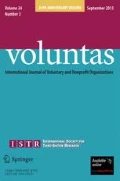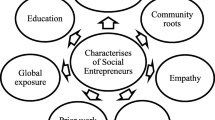Abstract
In recent years, social entrepreneurs in the third sector have played an increasingly important role in addressing societal problems. Despite their growing presence in civic society, little is known about how social entrepreneurs obtain the necessary skills, knowledge, and motivation to take on this role. This exploratory study empirically addresses this gap through 27 in-depth case studies of social entrepreneurial leaders of third-sector initiatives in Brazil. Findings show that the social entrepreneurs relied on a convergence of experiences including: direct experience with inequality, interaction with target populations, volunteer work, religious institutions, social activism, formal education, professional experience, reading, and intercultural interactions. The study also presents a nuanced understanding of how the interplay among life experiences and learning processes informed these third-sector leaders. Results are relevant to scholars and practitioners committed to fostering social entrepreneurship in the third sector.
Résumé
Ces dernières années, des entrepreneurs sociaux du troisième secteur ont joué un rôle toujours plus important dans la lutte contre les problèmes sociétaux. Malgré leur présence croissante dans la société civile, on sait peu de chose sur la façon dont les entrepreneurs sociaux obtiennent les compétences nécessaires, les connaissances et la motivation pour assumer ce rôle. Cette étude exploratoire comble cette lacune de manière empirique grâce à 27 études de cas approfondis de dirigeants sociaux des initiatives du troisième secteur au Brésil. Les résultats montrent que ces entrepreneurs sociaux s’appuient sur une convergence d’expériences, notamment: expérience directe avec les inégalités, interactions avec les populations cibles, bénévolat, institutions religieuses, militantisme social, éducation formelle, expérience professionnelle, lecture et interactions interculturelles. L’étude présente également une compréhension nuancée de la façon dont l’interaction entre les expériences de vie et les processus d’apprentissage a influencé ces dirigeants du troisième secteur. Les résultats s’appliquent aux chercheurs et aux praticiens soucieux de favoriser l’entrepreneuriat social dans le troisième secteur.
Zusammenfassung
In den letzten Jahren hat die Rolle sozialer Unternehmer im Dritten Sektor bei der Auseinandersetzung mit gesellschaftlichen Problemen an Bedeutung zugenommen. Doch trotz ihrer wachsenden Präsenz in der Bürgergesellschaft, ist nur wenig darüber bekannt, wie soziale Unternehmer die notwendigen Fähigkeiten, Kenntnisse und Anregungen erhalten, um diese Rolle auszuüben. In der vorligenden explorativen Studie wird eine empirische Untersuchung zu dieser Wissenslücke angestellt, im Rahmen derer 27 gründliche Fallstudien von Leitern sozialunternehmerischer Initiativen des Dritten Sektors in Brasilien durchgeführt werden. Die Ergebnisse zeigen, dass sich die sozialen Unternehmer auf eine Ansammlung von Erfahrungen verließen, unter anderem in folgenden Bereichen: unmittelbare Erfahrung im Zusammenhang mit herrschender Ungleichheit, Wechselbeziehungen zu den Zielbevölkerungsgruppen, ehrenamtliche Arbeit, religiöse Einrichtungen, sozialer Aktivismus, formale Bildung, berufliche Erfahrung, Lektüre und zwischenkulturelle Beziehungen. Die Studie präsentiert darüber hinaus ein differenzierteres Verständnis darüber, wie diese Unternehmensleiter von dem Zusammenspiel der Lebenserfahrungen und Lernprozesse beeinflusst wurden. Die Ergebnisse sind für Wissenschaftler und Praktiker relevant, die sich für eine Förderung des sozialen Unternehmertums im Dritten Sektor einsetzen.
Resumen
En los últimos años, los emprendedores sociales del sector terciario han desempeñado un papel cada vez más importante abordando los problemas de las sociedades. A pesar de su creciente presencia en la sociedad cívica, poco se conoce sobre cómo los emprendedores sociales obtienen las habilidades, el conocimiento y la motivación necesarios para asumir este papel. El presente estudio exploratorio aborda empíricamente este vacío mediante 27 estudios de casos en profundidad de líderes emprendedores sociales de iniciativas del sector terciario en Brasil. Los hallazgos muestran que los emprendedores sociales se apoyaron en una convergencia de experiencias que incluyen: experiencia directa con la desigualdad, interacción con poblaciones objetivo, trabajo de voluntario, instituciones religiosas, activismo social, educación formal, experiencia profesional, lectura e interacciones interculturales. El estudio presenta también una comprensión matizada de cómo la interacción entre las experiencias vitales y los procesos de aprendizaje conformó a estos líderes del sector terciario. Los resultados son relevantes para eruditos y profesionales comprometidos con el fomento del emprendimiento social en el sector terciario.
近年来, 从事第三产业的社会企业家在社会问题处理中起着越来越重要的作用, 尽管他们在公民社团中出现的次数越来越多, 但是,人们并不很清楚社会企业家是如何获得承担这一任务所需的必要的技能、知识和动力的。 本研究为探索性的,填补了这项空白,从经验主义角度对社会企业家在巴西领导第三产业倡议活动的27个案例进行了深入的研究。研究结果显示,这些 社会企业家们依赖的经历是综合性的, 包括对不平等的切身经历、与目标人群互动、志愿者工作、宗教机构、社会活动、正式教育、专业经验、阅读以及跨文化互动。 在这一研究中,对这些第三产业中的领袖们的 生活经验和学习过程的相互机制也有细微发现。研究结果对致力于促进第三行业创业的学者和从业人员具有相关性。
في السنوات الأخيرة لعبت أصحاب المشاريع الإجتماعية في القطاع الثالث دورا˝ متزايد الأهمية في معالجة المشاكل المجتمعية. على الرغم من وجودها المتزايد في المجتمع المدني، لا يعرف إلا القليل حول كيفية حصول أصحاب المشاريع الإجتماعية على المهارات اللازمة والمعرفة والدافع لتولي هذا الدور. تتناول هذه الدراسة إكتشاف تجريبي لهذه الفجوة من خلال 27 دراسة حالة متعمقة لقادة تنظيم المشاريع الإجتماعية لمبادرات القطاع الثالث في البرازيل. تشير النتائج إلى أن أصحاب المشاريع الإجتماعية إعتمدت على تقارب الخبرات بما في ذلك: الخبرة المباشرة مع عدم المساواة، التفاعل مع السكان المستهدفين، العمل التطوعي، المؤسسات الدينية، النشاط الاجتماعي، التعليم الرسمي، الخبرة المهنية، القراءة، والتفاعل بين الثقافات. تعرض الدراسة أيضا˝ فهم دقيق لكيفية تم إطلاع قادة القطاع الثالث عن طريق التفاعل بين خبرات الحياة وعمليات التعلم. النتائج ذات الصلة للباحثين والممارسين ملتزمة لتعزيز روح المبادرة الإجتماعية في القطاع الثالث.
Similar content being viewed by others
References
Achleitner, A., Lutz, E., Mayer, J., & Spiess-Knafl, W. (2013). Disentangling gut feeling: Assessing the integrity of social entrepreneurs. Voluntas, 24(1), 93–124.
Alvord, S. H., Brown, L. D., & Letts, C. W. (2004). Social entrepreneurship and societal transformation. Journal of Applied Behavioral Science, 40(3), 260–282.
Alvord, S. H., Brown, L. D., & Letts, C. W. (2009). Social entrepreneurship: leadership that facilitates societal transformation—an exploratory study. Retrieved February 15, 2009, from http://www.innovations.harvard.edu/showdoc.html?id=2535.
Ashoka. (2011). What is a social entrepreneur. Retrieved February 15, 2009, from: http://www.ashoka.org/social_entrepreneur.
Astin, A., Vogelgesang, L. Ikeda, E., & Yee, J. (2000). How service learning affects students. Retrieved December 1, 2011, from http://heri.ucla.edu/pdfs/rhowas.pdf.
Bateson, M. C. (1995). Peripheral visions: Learning along the way. New York: Harper Collins.
Bornstein, D. (1998). Changing the world on a shoestring. Atlantic Monthly, 281(1), 34–39.
Bornstein, (2007). How to change the world: Social entrepreneurs and the power of new ideas. New York: Oxford University Press.
Boud, D., Keogh, R., & Walker, D. (1985). Reflection: Turning experience into learning. London: Kogan Page.
Brock, D. D. (2008). Social entrepreneurship teaching resources handbook for faculty engaged in teaching and research in social entrepreneurship. Ashoka’s Global Academy for Social Entrepreneurship.
Brookfield, S. (1986). Understanding and facilitating adult learning. San Francisco: Jossey-Bass.
Brookfield, S. (1991). The development of critical reflection in adulthood. Adult Education Quarterly, 41(21), 75–91.
Brookfield, S. (1995). Adult learning: An overview. In A. Tuinjman (Ed.), International encyclopedia of education. Oxford: Pergamon Press.
Brookfield, S. (2008). Radical questioning on the long walk to freedom: Nelson Mandela and the practice of critical reflection. Adult Education Quarterly, 58(2), 95–109.
Brouard, F., & Larivet, S. (2010). Essay of clarification and definitions of the related concepts of social enterprise, social entrepreneur and social entrepreneurship. In A. Fayolle & H. Matlay’s (Eds.), Handbook of research on social entrepreneurship (pp. 29–56). Cheltenham: Edward Elgar Publishing Limited.
Candy, P., Harri-Augstein, S., & Thomas, L. (1985). Reflection and the self-organized learner: A model of learning conversations in Reflection: Turning experience into learning. London: Kogan Page.
Dees, J. G. (1998). The meaning of social entrepreneurship. Retrieved March 11, 2011 from http://www.partnerships.org.au/Library/the_meaning_of_social_entrepreneurship.htm.
Defourny, J. (2010). Concepts and realities of social enterprise: A European perspective. In A. Fayolle & H. Matlays (Eds.), Handbook of research on social entrepreneurship (pp. 57–87). Cheltenham: Edward Elgar Publishing Limited.
Dewey, J. (1938). Experience and education. The Kappa Delta Pi lecture series. New York: MacMillian Publishing Company.
Fayolle, A., & Matlay, H. (2010). Social entrepreneurship: a multicultural and multidimensional perspective. In A. Fayolle & H. Matlay (Eds.), Handbook of research on social entrepreneurship (pp. 1–14). Cheltenham: Edward Elgar Publishing Inc.
Fenwick, T. (2003). Learning through experience: Troubling orthodoxies and intersecting questions (the professional practices in adult education and lifelong learning series). Malabar: Krieger Publishing Company.
Fitzgerald, L., et al. (2013). Distributed leadership patterns and service improvement: Evidence and argument from English healthcare. The Leadership Quarterly, 24, 227–239.
Hochstetler, K. (2000). Democratizing pressures from below? Social movements in the new Brazilian democracy. In P. R. Kingstone & T. J. Power (Eds.), Democratic Brazil: Actors, institutions, and processes (pp. 162–182). Pittsburgh: University of Pittsburgh Press.
Houle, C. (1980). Continuing learning in the professions. San Francisco: Jossey-Bass.
Instituto Brasileiro de Geografia e Estatistica. (2008). IBGE—Instituto Brasileiro de Geografia e Estatística. Retrieved Feburary 15, 2009, from www.ibge.gov.br/english/estatistica/economia/fasfil/2005/default.shtm.
Jacobson, M., & Ruddy, M. (2004). Open to outcome: A practical guide for facilitating and teaching experiential reflection. Oklahoma City: Wood ‘N’ Barnes.
Jarvis, P. (1987). Adult learning in the social context. London: Croom Helm.
Jarvis, P. (1995). Adult and continuing education: Theory and practice (2nd ed.). London: Routledge.
Johnson, S. (2002). Social entrepreneurship literature review. New Academy Review, 2(2), 42.
Kolb, D. A. (1983). Experiential learning: Experience as the source of learning and development. Upper Saddle River: Prentice Hall.
Komives, S., & Wagner, W. (2009). Leadership for a better world: Understanding the social model change of leadership development (2nd ed.). San Francisco: Jossey-Bass.
Landim, L., & Thompson, A. (1997). Nongovernmental organizations and philanthropy in Latin America an overview. Voluntas, 8(4), 337–350.
Lave, J., & Wenger, E. (1991). Situated learning: Legitimate peripheral participation. Cambrige: University Press.
Leadbeater, C. (1997). The rise of the social entrepreneur. London: Demos.
Mair, J., & Marti, I. (2006). Social entrepreneurship research: A source of explanation, prediction, and delight. Journal of World Business, 41(1), 36–44.
Marshall, C., & Rossman, G. B. (2006). Designing qualitative research (4th ed.). Thousand Oaks, CA: Sage.
Martin, B. (2007). Activism, social and political. In G. L. Anderson & K. G. Herr (Eds.), Encyclopedia of activism and social justice (pp. 19–27). Thousand Oaks: Sage Publications, Inc.
Maxwell, J. (2005). Qualitative research design: An interactive approach (2nd ed.). Thousand Oaks: Sage Publications Inc.
Mezirow, J. (1990). Fostering critical reflection in adulthood: A guide to transformative and emancipatory learning. San Francisco: Jossey-Bass.
Mezirow, J. (1991). Transformative dimensions of adult learning. San Francisco: Jossey-Bass.
Michelson, (1996). Beyond Galileo’s telescope: Situated knowledge and the assessment of experiential learning. Adult Education Quarterly, 46(4), 185–196.
Powell, J. P. (1985). Autobiographical learning. In D. Boud, R. Keogh, & D. Walker (Eds.), Reflection: Turning experience into learning (pp. 41–51). London: Kogan Page.
Ratnatunga, J. (1997). A “citation classics” analysis of articles in contemporary small enterprise research. Journal of Business Venturing, 12(3), 197–212.
Scheiber, L. (2014). Social capital and the target population. Social Enterprise Journal, 10(2), 121–134.
Scheuerle, T., & Schmitz, B. (2011). Investigating social entrepreneurship in Germany—A broad empirical inventory. Paper presented at the Association for Research on Nonprofit Organizations and Voluntary Action, Toronto.
Smith, M.K. (2001). David A. Kolb on experiential learning. Retrieved February 15, 2011, from http://www.infed.org/biblio/b-explrn.htm.
Stecker, M. (2014). Revolutionizing the nonprofit sector through social entrepreneurship. Journal of Economic Issues., 48(2), 349–358.
Tuijnman, A., & Van der Kamp, M. (1992). Learning across the lifespan: Theories, research, policies. International Review of Education, 40(2), 186–188.
Uphoff, N., Esman, M., & Anirudh, K. (1998). Reason for success: Learning from instructive experiences in rural devleopment. West Hartford: Kumarian Press.
Van Ryzin, G., Grossman, S., DiPadova-Stocks, L., & Bergrud, E. (2009). Portrait of the social entrepreneur: Statistical evidence from a US Panel. Voluntas, 20(2), 129–140.
Walker, D. (1985). Writing and reflection. In D. Boud, R. Keogh, & D. Walker (Eds.), Reflection: Turning experience into learning (pp. 41–51). London: Kogan Page.
World Bank. (2010a). World development indicators database. Washington DC: World Bank.
World Bank. (2010b). Achieving world class education in Brazil: The next agenda. Washington DC: World Bank.
Zahara, S. A., Gedajlovic, E., Neubaum, D. O., & Shulman, J. M. (2009). A typology of entrepreneurs: Motives, search processes and ethical challenges. Journal of Business Venturing, 24(5), 519–532.
Zahara, S., Newey, L., & Li, Y. (2014). Implications of social entrepreneurship for international entrepreneurship. Entrepreneurship Theory and Practice, 38(1), 137–158.
Acknowledgments
I would like to thank Dr. Lesley Bartlett, Dr. Gary Natriello, and Dr. Hope Leichter for valuable comments. Additionally, I would like to thank the Fulbright Program, Teachers College, Columbia University, and the Institute of Latin American Studies at Columbia University for financial support.
Author information
Authors and Affiliations
Corresponding author
Rights and permissions
About this article
Cite this article
Scheiber, L. How Social Entrepreneurs in the Third Sector Learn from Life Experiences. Voluntas 27, 1694–1717 (2016). https://doi.org/10.1007/s11266-015-9597-8
Published:
Issue Date:
DOI: https://doi.org/10.1007/s11266-015-9597-8




